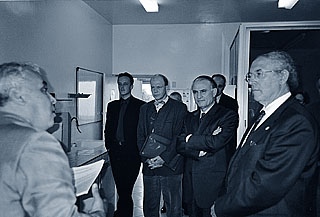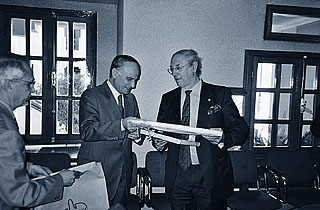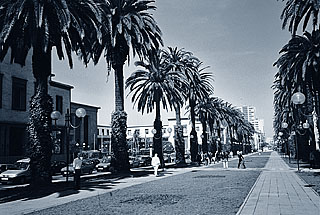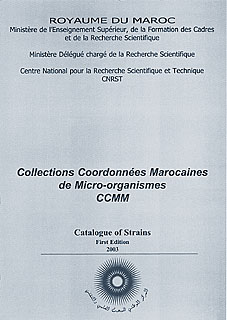
Edition 13 - May, 2003
 Edition 13 - May, 2003 |
The BCCM go south: The launching of the Moroccan Co-ordinated Collections of Micro-organisms |
November 26, 1996, somewhere between Casablanca and Marrakech, the moonless night is brightened by the dazzling flashes of the headlights of the trucks rushing by on the road and shivering our car. My colleague, Prof. Mohamed Amar, is tired so I talk to keep him awake. It was a very busy day, we left Rabat early this morning to visit the Faculty of Sciences and the Institute Pasteur in Casablanca, and we are driving now to visit the INRA research centre in Marrakech. The visit is scheduled for early tomorrow morning.
 Minister Fassi-Fehri (second from right) and Minister Ylieff (right) are listening to Prof. Amar (left) presenting the activities of the CCMM freeze-dry unit. In the background are Mr. Kaizin and Mr. Pierce from Belgian Technical Cooperation, who are in charge of the administrative follow up of the CCMM project. Also present were Dr. Nicole Henry, Head of the R&D Department of OSTC, in charge of the BCCM, Dr. Saïd Bel Cadi, Director of Research and University co-operation, and representatives of both the BCCM and the CCMM collections. |
 Ministers Fassi-Fehri and Ylieff exchanging presents during the last working session organised at the Ministère de l’Enseignement supérieur, de la formation et de la Recherche. This Ministry has invested in the infrastructure of the CCMM freeze-dry and conservation units, in a generator set, in AC system, and in a dust-free room among other things. The Belgian Federal Public Service of Foreign Affairs, Foreign Trade and Development Co-operation funded the scientific equipment chosen by BCCM and CCMM experts to equip the laboratory. |
Already in 1996, BCCM had contacts with several microbiological institutes
in Morocco. Both our Belgian and Moroccan colleagues realised that long-term
conservation of microbial resources was needed in Morocco. To preserve and
study the local microbial diversity, we wanted to start a network of Moroccan
laboratories.
What we did not yet know is that it would take us seven years to do it. During
this long journey, we encountered human, scientific, technical and logistic
difficulties, but the final results are beyond all of our hopes and expectations.
Some were sceptical about the success of the endeavour; others were reluctant
to share their resources and information for the benefit of the Moroccan scientific
community. Then there was the logistical burden of getting the strains from
and back to Morocco for cross-analysis as well as the purchasing, testing and
shipment of all equipment, the associated administrative paperwork mountain,
and the numerous small technical defaults. However, these were all overcome
with the support and willingness of the various partners.
Finally, in March 2003, the Moroccan Co-ordinated Collections of Micro-organisms
(CCMM) was established.
At present, the CCMM constitutes a network of ten (1) laboratories, which network,
it is expected, will be extended in the future. They have a central freeze-drying
facility and a collection of micro-organisms selected for distribution. With
the support of the BCCM, an electronic database was designed to ensure data
management. The CCMM also have an internet connection hosted by the CNRST (URL:
http://www.cnr.ac.ma), a library of reference books on microbiology and culture-collection
management, and a capacity-building programme with training courses and workshops
(2). The publication of the first catalogue of microbial resources isolated
in Morocco crowned the work and highlighted all the other aspects of the project.
The CCMM is the first national network of culture collections on the African
continent. Both the network and the catalogue were set up in close bilateral
collaboration with the BCCM.
In addition to this scientific and technical capacity building (3), the BCCM
urged their colleagues to develop in parallel appropriate legal and administrative
rules to protect their progress in biotechnology and suggested that Morocco
should ratify the Budapest Treaty on the international recognition of deposits
of micro-organisms for patent purposes. The Moroccan authorities took this
seriously, and the Moroccan Industrial and Commercial Property Office organised
a two-day seminar on the Budapest Treaty in April 2002. Speakers of the World
Intellectual Property Organisation as well as of the BCCM were invited to share
their knowledge and experience with Moroccan scientists and industrial property
representatives.
Well aware of these activities and the subsequent perspectives of biotechnological
development in Morocco, the Minister of Research, Dr Fassi-Fehri invited his
Belgian colleague, Minister Yvan Ylieff, who is in charge of scientific research,
for a working visit in Morocco last March. This visit was the occasion for
the Ministers and their staffs to build on the current realisations and to
foster future collaboration in biotechnology between the two countries bilaterally
as well as in the context of European scientific co-operation.
It was also a good opportunity for the representatives of the competent administrations
to meet: in Belgium, the Federal Public Planning Service for Science Policy
has initiated and still manages the project via the BCCM, while the Federal
Public Service of Foreign Affairs, Foreign Trade and Development Co-operation
contributed to fund the project; in Morocco the Ministère de l'Enseignement
Supérieur, de la Formation des Cadres et de la Recherche has initiated
the project with its Belgian counterparts and is still funding and closely
monitoring it. These bodies have bridged their respective scientific communities
to make durable biotech development possible that will be beneficial to all
of the partners: capacity building for some and access to microbial resources
for others.
As in 1996, the four days of March 2003 were busy. While the Belgian and the
Moroccan Ministers and their teams were visiting laboratories and research
institutions around Rabat and Casablanca, the CCMM and BCCM partners met to
prepare the next phase. After having set up the CCMM as a tool to preserve,
study and characterise microbial resources, it is time to valorise it in a
specific research programme with a view to direct and indirect socio-economic
results.
 |
 CCMM catalogue The 1st edition of the CCMM catalogue was prepared in collaboration
with the BCCM. |
The CCMM and the BCCM intend to develop specific research activities in applied
medical and agro-food mycology as well as in applied food bacteriology. Both
partners have focused their research on essential sectors where there is an
urgent need for updated technical information to help appropriate decision-making
and to initiate efficient problem solving. The next phase of the collaboration
involves BCCM/MUCL in the investigation of the micro-rhizosphere of the date
palm, the Argania tree and their associated cultures, all of which have important
socio-economic significance for the local population. BCCM/LMG and its Moroccan
partners plan to characterise, preserve and valorise lactic acid bacteria and
water bacteria, the former for their important role in diary nutrition, the
latter for the safety of the water supply. In the field of human health, BCCM/IHEM
wants to collaborate on an epidemiological study on skin and scalp diseases
to help the authorities take appropriate
prophylactic and curative measures. In conclusion, the journey started in 1996
is still continuing with encouraging prospects and an even longer way to go.
1. Under the Ministère de l'Enseignement supérieur, de la formation
et de la Recherche: Faculty of Sciences of Marrakech, Faculty of Sciences of
Meknès, Faculty of Medicine and Pharmacy of Rabat, CNRST- National Centre
for Scientific and Technical Research and ENA- National School of Agriculture;
under the Ministry of agriculture: IAV Hassan II Rabat, IAV Hassan II Agadir
and the INRA network (Rabat, Kénitra, Marrakech); under the Ministry of
health: Institute Pasteur; under the Ministry of equipment: ONEP- National Office
for drinking water.
2. Among others the Training Course on Management of Culture Collections of Micro-organisms (Jointly organised by the World Federation for Culture Collections (WFCC), US Federation for Culture Collections (USFCC), CCMM and BCCM (Rabat, 3-7 May 2004).
3. The international co-operation programme of the BCCM is developed in compliance with the Convention on Biological Diversity, which includes capacity building activities.
Contact
Philippe Desmeth
BCCM Officer for international
cooperation
Tel.: +32 (0)10 47 89 36
+ 32 (0)2 238 37 13
Fax: +32 (0)10 45 15 01
E-mail: desmeth@mbla.ucl.ac.be
Home |
Contents Edition 13 - May, 2003 |
Next Article Edition 13 - May, 2003 |